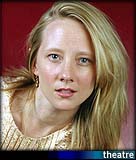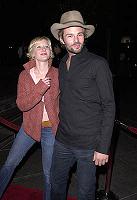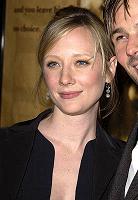
Her life | Her movies | Her book | Her realizations | Her words | Her pictures | Her identity | Her videos | Her news | Her links | Our stats | Her plays | My Store
Her life
Part 1 :
"wild-child-Heche"
- Childhood
- The rise
- A star is born
- Hollywood earthquake
- Sensational development
- Revelations
- Happy ending ?
Part 2 :
Post Fresno
"I've always kind of gone with my heart."
Anne on BroadwayProof. At the beginning of summer 2002, Anne is on Broadway. She signed for 3 and half months to play the leading part in "Proof" at the Manhattan Theatre Club. It is the David Auburn's drama, which obtained the Pulitzer price in 2001. After the tumult of the last years, she want to show she is ready to start again a new life personally and professionally. For her, the events of Fresno, are the symbolic hinge between the past and the present, the moment when things rocked to the right side. Post Fresno. She explains that in an interview granted to MARK KENNEDY (Associated Press)."I look at my life and I joke about it as being pre and post-Fresno," Heche says. "It's like when I truly say that I understood. That was THE moment of my life. Then everything fell in place."After having remained one year far from the projectors, Heche says that she recovered from her mental disorders and that she is ready to play again. The most astonishing is the subject of the play, which has strong similarities whith Anne's past life. "We've definitely walked into metaphor land for Anne's life," says Heche after a recent rehearsal in Times Square. "There are many, many parallels in here."Heche plays Catherine, the daughter of a math genius whose once-sharp mind deteriorates. It is Catherine's fear that just as she shares her father's flair for numbers, she also will inherit his madness. That fear Heche knows all too well : In her autobiography last year, she revealed that when she was a child she had been abused by her father, a secretly gay strict Baptist who died of AIDS in 1984. "I know that I have a close connection, certainly, to the fear of being my father that Catherine has. Even though my father was never diagnosed with schizophrenia, there was certainly a thought that he might be. And even though I was never diagnosed, there was a thought that I might be. "The funny thing is, there's an understanding of madness in this play that comes from the father after he's dead. I think what's unique about my personal story is that I've understood my madness while I'm alive," she says.Coley. As she talks, Heche is putting the finishing touches on a homemade Father's Day card for her husband, cameraman Coleman Laffoon. Anne gleefully folds pieces of construction paper and scatters store-bought stickers of stars and circles around her crude drawing of a necktie. "I think he'll love it," she says, inspecting her work.A new life. She must now concentrate herself on her current work, she entitled her last adventure, " Anne on Broadway ". "Every day, there's a new discovery and a new fear," Heche says. "Today's fear was, 'Oh, my god. Even if I can play this, how am I going to do it for 3 and half months?'"The audience, meanwhile, may find it difficult to separate Heche from her post-Fresno revelations, a fact of which Heche is well aware. "Leave your preconditions at the door, " she advises. "Because I've gone off the path of actress into some places that people don't like me to go, will they be able to come back to the fact that I'm an actress? I don't know-- "Hopefully, they will understand and be able to see how far I've come-- that my life has led me to the richness and fullness of being able to do this show."Concerning the tumults of her past, Anne says : "it's just that-- in the past. |
|
|
|
|
|
| |
| Anne and Coley |
| |
| Anne and Coley |
Her life | Her movies | Her book | Her realizations | Her words | Her pictures | Her identity | Her videos | Her news | Her links | Our stats | Her plays | My Store
This is not an official web site
Please send comments to : webmaster@anneheche.com.fr
Last release:
© www.AnneHeche.com.fr 2002-2013



